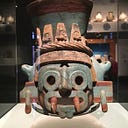It's very symbolic. The survivors, representing Indigenous peoples, watch the "Industrial Age" collapse into a pile of wreckage. Just the way the Inuit watched the Greenland Norse colony collapse from starvation rather than abandon their European lifeway.
You read my Thanksgiving piece so you know I think there is a tendency to fetishize "The Indigenous". I think "Moderns" tend to misinterpret the lessons Indigenous cultures really show us about what "sustainability" truly means.
What makes them sustainable is that they regulate and control individual life and choices to a degree many of us would find stifling. In tribal societies EVERYTHING you do, at every stage of your life, is laid out for you.
Have you read the Gormenghast Trilogy?
Tribal life is like that, very ritualized.
Conformity creates Cultural Stability.
Stability Creates Sustainability.
Most Moderns who gush about the "wisdom of the Indigenous" don't have an f'ing clue about what living "like the Indigenous" is really like. They do not encourage individuality and doing your own thing. Punishments for breaking rules and taboos are often harsh.
The lessons I appreciate from Indigenous cultures are.
They are adaptive to their environment.
They emphasize cultural wealth rather than material wealth.
They develop dense "culture webs" that embed individuals and constrain the range of individual actions.
They emphasize stability and security over change and "progress".
I'm very curious. What is it that you think of, when you think of "Indigenous Wisdom"?
We use that phrase a lot, but what EXACTLY do we mean by it?
If you had to adopt an Indigenous Lifeway what would you WANT that to be like?
In an Anthro class you could build a whole unit of study around this discussion.
